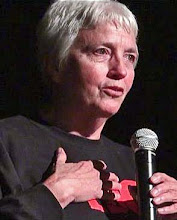 If you wait long enough and do nothing, problems usually don’t go away. Such is the case illustrated by the astounding increase of homelessness among children and youth in this country. The latest numbers just released show a jaw-dropping 100% increase of students identified as homeless since I’ve been on the road—10 years ago.
If you wait long enough and do nothing, problems usually don’t go away. Such is the case illustrated by the astounding increase of homelessness among children and youth in this country. The latest numbers just released show a jaw-dropping 100% increase of students identified as homeless since I’ve been on the road—10 years ago.US Department of Education numbers indicate 1,360,747 students identified experienced homelessness in the 2013-14 school year, 8% more than the previous year.
I’m almost too numb to be shocked. Almost.
To be clear, the 1.36 million number does not include younger/older siblings or parents. And it only represents those students identified as homeless under the McKinney-Vento Homeless Assistance Act’s Education for Homeless Children and Youth program, with specific qualifiers. I suspect that the number would actually double if we counted thoroughly.
 As part of my work with my nonprofit organization HEAR US Inc., I spent several weeks this year filming in beleaguered Kansas, including a week at Camp IBA (Imagine. Believe. Achieve.), an astounding creation of the Wichita Public School District 259’s McKinney-Vento Homeless Education program. I can’t get these young faces out of my head or heart.
As part of my work with my nonprofit organization HEAR US Inc., I spent several weeks this year filming in beleaguered Kansas, including a week at Camp IBA (Imagine. Believe. Achieve.), an astounding creation of the Wichita Public School District 259’s McKinney-Vento Homeless Education program. I can’t get these young faces out of my head or heart.
I sat in on a campfire-style conversation of 10-12-year old girls, gathered in a circle on the floor of their camp/classroom. One girl shared her dismay of not knowing where her family would be sleeping night-to-night. Another talked about how oppressively crowded it was in their motel room. Another revealed her fear of violence if her mother’s ex-boyfriend would return. These matter-of-fact topics spun around as if these girls were adults chatting about a popular soap opera.
Another girl told me what she liked most about the camp: she could “depend” on people, certainly the teachers and volunteers, but also her campmates. I suspect she knows about those she can’t depend on.
Real kids. Real feelings. Real homelessness.
We apparently have decided that certain groups of homeless persons must be expendable. Kids have drawn the short straw, that, despite what we know would work for many families.
Congress is still pondering whether to let homeless families and youth qualify for federal assistance to escape homelessness. Of course, if they do, Congress might need to do something about the dire lack of affordable housing in communities from coast to coast. Legislation is dangling in the Capitol that might improve this appalling neglect, the Homeless Children and Youth Act, but though I won’t bet my lunch money that they’ll get around to passing this bipartisan, bicameral legislation any time soon, we still need to be at the table.
As one of a handful of advocates who have been fighting for the rights of homeless families and youth for decades, I continue to be astounded at how few people, including elected officials, grasp that we even have millions of kids and families without homes, much less realize the dire conditions they face. By our collective neglect, we write off this population until they become adults on the streets.
Something can be done. Although this seems like a long-shot, stranger things have happened in Congress. You and all those in your network can contact your congressional delegation—quickly and painlessly—by going to www.helphomelesskidsnow.org and clicking on the TAKE ACTION link. By entering your zip code, your representatives’ info will pop up. You can customize the letter or send it as is.
The venerable Senator Paul Simon (D, IL, deceased) once told me that until elected officials heard from their constituents that homelessness was an issue, nothing would be done. It seems like a simple formula—contact your legislator, make your wishes known, they respond. (Since big money isn't available for this issue, we'll have to do the Paul Simon method.)
With the number of homeless students increasing each year, it seems like more and more people should be aware of this crisis, maybe even knowing someone who fell into homelessness. The best motivation we have is think of ourselves in the place of those in homeless situations.
What would we want to have happen if those kids sitting in the circle discussing their homelessness were our kids?








No comments:
Post a Comment